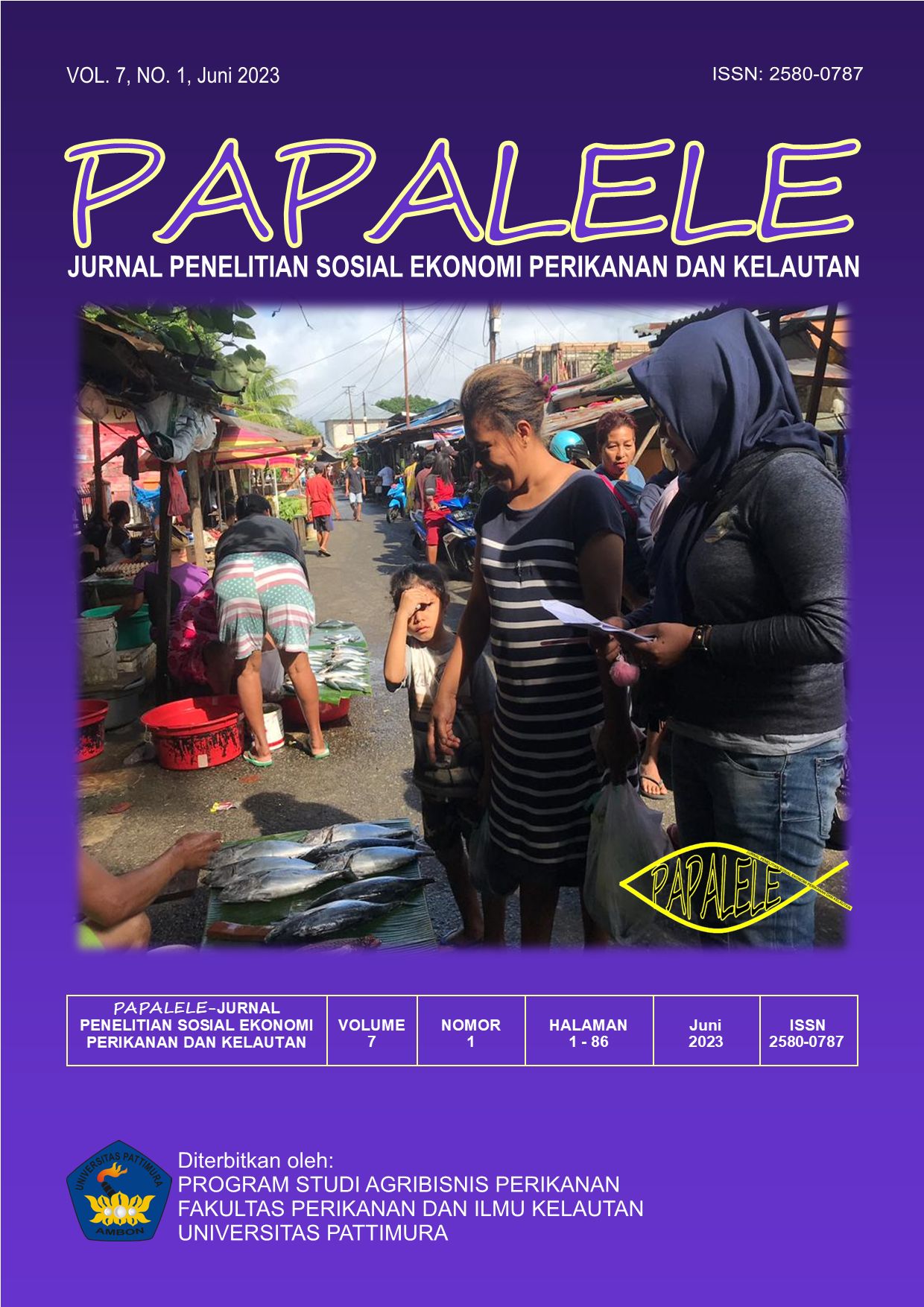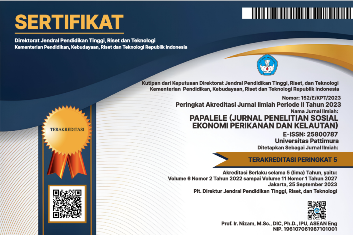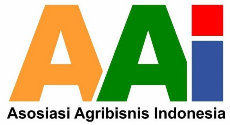PERHITUNGAN NILAI EKONOMI SUMBERDAYA TERUMBU KARANG BERDASARKAN WILLINGNESS TO DONATE (WTD) WISATAWAN BAHARI DI TAMAN NASIONAL KARIMUNJAWA
Abstract
Karimunjawa National Park (TNKJ) as one of the seven marine national parks is priority for marine management. Ecosystems that contribute a lot of indirect value is coral reef ecosystems. Its utilization for marine tourism activities has enormous potential but is also vulnerable to damage. Calculation of economic value is carried out as basic information on tourist willingness in terms of coral reef conservation through a Willingness to Donate (WTD) that it can be used as one of the inputs for sustainable management. The research was conducted in the main waters of the TNKJ marine tourism utilization zone in August-September 2017. Tourist data collection was carried out through structured questionnaire with 45 selected respondents. The results show tourists who use coral reef ecosystems snorkel as many as 4755 people peryear and 853 people dive peryear in an area of 886,302.7841 m2. The average WTD for snorkeling tourists is IDR206,250 and IDR87,500 for diving tourists. The total cost of rehabilitation of coral reefs per year is IDR1,055,356,250 per year. The resulting value can be used as a reference for the cost of repairing damaged ecosystems, responsible marine tourism activities and as an alternative priority incentive for coral reef conservation activities in TNKJ.
Downloads
References
Adikampana, I. M. (2013). Pariwisata Berbasis Masyarakat. Jakarta, ID: Cakra Press.
Asmari, N. G. A. D., & Sutrisna, I. K. (2021). Pengaruh Jumlah Kunjungan Wisatawan, Pengeluaran Wisatawan, dan Investasi terhadap Penyerapan Tenaga Kerja dan Pertumbuhan Ekonomi. E-Jurnal Ekonomi Pembangunan Unud. Vol 10(8), 3134–3163. Retrieved from https://ojs.unud.ac.id/index.php/eep/article/view/52046
Atjo, A. A., Fitriah, R., & Nur, R. (2019). Analisis Potensi Ekosistem Terumbu Karang Untuk Kesesuaian Lokasi Wisata Selam, Pantai Dato Kabupaten Majene. SIGANUS: Journal of Fisheries and Marine Science. Vol 1(1), 1–9. https://doi.org/10.31605/siganus.v1i1.486
Cárdenas, S. A., & Lew, D. K. (2016). Factors influencing willingness to donate to marine endangered species recovery in the Galapagos National Park, Ecuador. Frontiers in Marine Science, Vol 3(MAY), 1–14. https://doi.org/10.3389/fmars.2016.00060
Christie, P. (2004). Marine protected areas as biological successes and social failures in Southeast Asia. American Fisheries Society Symposium. 2004(42), 155–164. Retrieved from researchgate.net/publication/228804569_Marine_Protected_Areas_as_biological_successes_and_social_failures_in_Southeast_Asia
Darma, I. W. A. S., Gunawan, I. P. E. G., & Sutramiani, N. P. (2020). Peramalan Jumlah Kunjungan Wisatawan Menggunakan Triple Exponential Smoothing. Jurnal Ilmiah Merpati (Menara Penelitian Akademika Teknologi Informasi). Vol 8(3), 211. https://doi.org/10.24843/jim.2020.v08.i03.p06
Hazmi AS. 2014. Aktivitas Wisatawan dan Presepsinya tentang Objek Wisata Alam di Zona Pemanfaatan Taman Nasional Laut Karimunjawa [skripsi]. Yogyakarta (ID): Universitas Gajah Mada.
Mazaya, A. F. A., Yulianda, F., & Taryono, T. (2019). Economic valuation of coral reef ecosystem for marine tourismin Karimunjawa National Park. IOP Conference Series: Earth and Environmental Science. Vol 241(1). https://doi.org/10.1088/1755-1315/241/1/012025
Mazaya, A. F. A., Yulianda, F., & Taryono, T. (2020). Marine Ecotourism Demand (Snorkeling and Diving) and Coral Reefs Resources Valuation in Karimunjawa National Park. Jurnal Ilmu Pertanian Indonesia. Vol 25(1), 26–34. https://doi.org/10.18343/jipi.25.1.26
Pardede, S., Tarigan, S. A. R., Setiawan F., Muttaqin E., Muttaqin A., Muhidin. (2016). Monitoring Ekosistem Terumbu Karang Taman Nasional Karimunjawa. (WCS Technical Report REP/LXVI/EXT/05/16/BAH). Wildlife Conservation Society Indonesia.
Orams M. 1999. Marine Tourism, Development, Impact, and Management. London, GB: Routledge.
Pascal N, Allenbach M., Rathwaite A., Burke L., Port G. L., Clua E. 2016. Economic valuation of coral reef ecosystem service of coastal protection: Apragmatic approach. Economic Services. Vol 21(2016), 72-80. http://dx.doi.org/10.1016/j.ecoser.2016.07.005
Sugiarto, E. (2017). Pengantar Ekowisata. Yogyakarta, ID: Kithah Publishing.
Wahyuni, I. A. T., & Adikampana, I. M. (2021). Peran Operator Wisata Bahari dan Wisatawan Terhadap Pelestarian Terumbu Karang di Pulau Menjangan Kawasan Taman Nasional Bali Barat. Jurnal Destinasi Pariwisata. Vol 9(1), 211. https://doi.org/10.24843/jdepar.2021.v09.i01.p27
Yulianda, F., & Mazaya, A. F. A. (2021). Potential carrying capacity of marine ecotourism in Sub-region III of Seribu Islands Marine National Park. IOP Conference Series: Earth and Environmental Science. Vol 744(1). https://doi.org/10.1088/1755-1315/744/1/012106
Zhang, F., Wang, X. H., Nunes, P. A. L. D., & Ma, C. (2015). The recreational value of gold coast beaches, Australia: An application of the travel cost method. Ecosystem Services. Vol 11, 106–114. https://doi.org/10.1016/j.ecoser.2014.09.001.
Copyright (c) 2023 Amalia Febryane Adhani Mazaya, Fredinan Yulianda, Taryono Taryono

This work is licensed under a Creative Commons Attribution-NonCommercial 4.0 International License.











